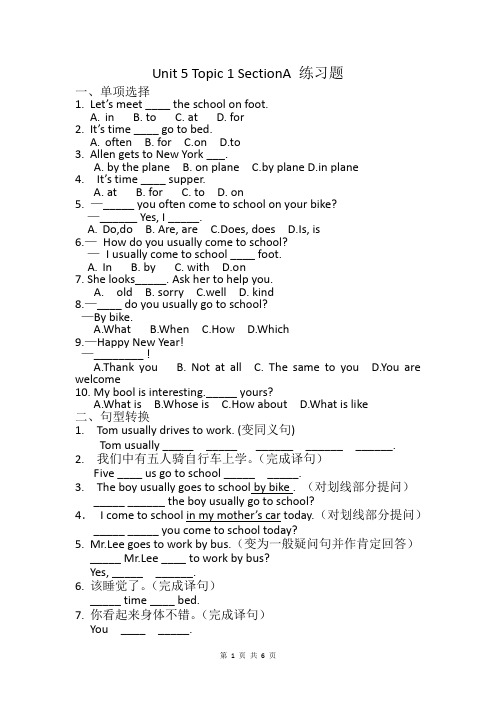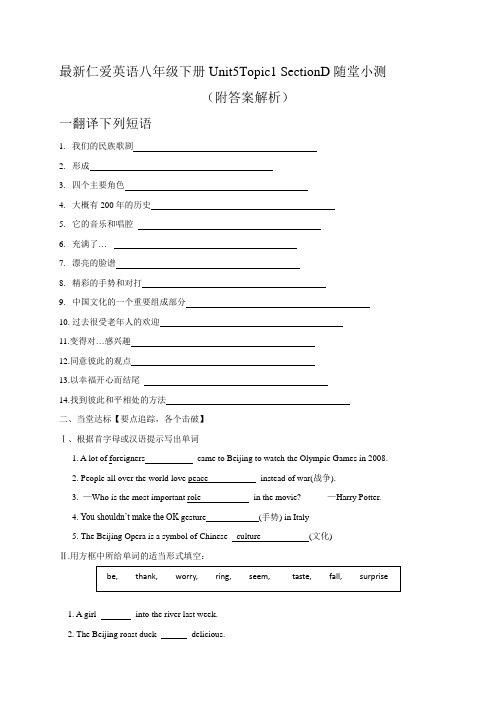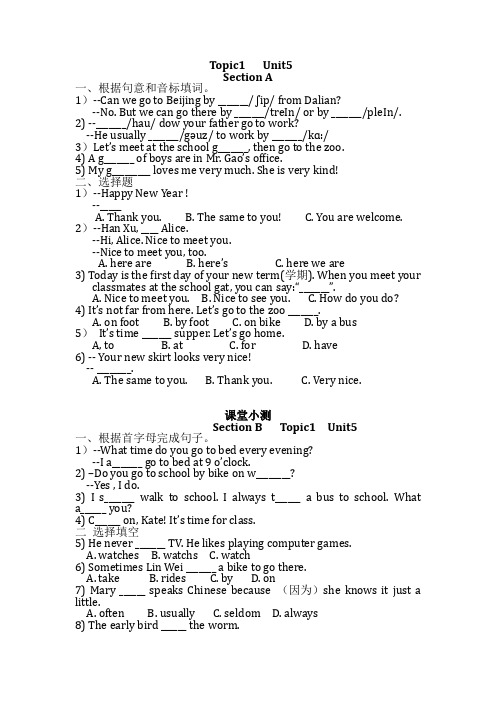Unit 5 Topic 1 Section D
- 格式:ppt
- 大小:3.87 MB
- 文档页数:13

七年级上册仁爱版英语sectionD句子意思Unit1 Making new friends.Topic1 Wecome to China!Grammar:Present Simpie:to be1.I'm Kangkang. I'm=Iam 我是康康。
我是=我是2-Are you Michael?你是迈克尔吗?--Yes, I am./ No, I'm not. Yes, I am./ No, I'm not.是的,我是。
/不,我不是。
3.Mr. Brown,this is my mom.布朗老师,这是我妈妈。
Functions1.--Good morning/afternoon.早上/下午好!- Good morning /afternoon.星上/下午好!2.--Hello!/ Hi!您好! /你好!-- Hello!!Hi!您好! /你好!3.--Nice to meetlsee you.很高兴见到你。
--Nice to meet/see you, too.见到你我也很高兴。
4. --How do you do?你好!- How do you do?你好!5.--Welcome to China!欢迎来到中国!- Thank you./ Thanks.谢谢你! /谢谢!6.--How are you?你好吗?--Fine, thanks. And you?/ I'm OK.很好,谢谢,你呢?/我很好。
7.Goodbye./ Bye.再见! /再见!Mom, this is my teacher, Mr. Brown.妈妈,这位是我的老师,布朗老师。
8.--Here you are.给你。
--Thank you.谢谢。
Topic2 Were are you from?Grammar:Subjec tpronouns1.--Is she from Canada?她来自加拿大吗?--Yes, she is./ No,she isn't.是的,她是。

Unit 5 Topic 1 SectionA 练习题一、单项选择1.Let’s meet ____ the school on foot.A.inB. toC. atD. for2.It’s time ____ go to bed.A.oftenB. forC.onD.to3.Allen gets to New York ___.A. by the planeB. on planeC.by planeD.in plane4. It’s time ____ supper.A. atB. forC. toD. on5. —_____ you often come to school on your bike?—______ Yes, I _____.A.Do,doB. Are, areC.Does, doesD.Is, is6.—How do you usually come to school?—I usually come to school ____ foot.A.InB. byC. withD.on7. She looks_____. Ask her to help you.A. oldB. sorryC.wellD. kind8.—____ do you usually go to school?—By bike.A.WhatB.WhenC.HowD.Which9.—Happy New Year!—________ !A.Thank youB. Not at allC. The same to youD.You are welcome10. My bool is interesting._____ yours?A.What isB.Whose isC.How aboutD.What is like二、句型转换1. Tom usually drives to work. (变同义句)Tom usually _____ _____ ______ ______ ______.2. 我们中有五人骑自行车上学。

最新仁爱英语八年级下册Unit5Topic1 SectionD 随堂小测(附答案解析)一翻译下列短语1. 我们的民族歌剧2. 形成3. 四个主要角色4. 大概有200年的历史5. 它的音乐和唱腔_6. 充满了… _7. 漂亮的脸谱8. 精彩的手势和对打9. 中国文化的一个重要组成部分10. 过去很受老年人的欢迎 _11.变得对…感兴趣12.同意彼此的观点13.以幸福开心而结尾_ _14.找到彼此和平相处的方法二、当堂达标【要点追踪,各个击破】Ⅰ、根据首字母或汉语提示写出单词came to Beijing to watch the Olympic Games in 2008.2. People all over the world love peace instead of war(战争).3. —Who is the most important role in the movie? —Harry Potter.4. You shouldn’t make the OK gesture (手势) in Italy5. The Beijing Opera is a symbol of Chinese culture (文化)Ⅱ.用方框中所给单词的适当形式填空:1. A girlinto the river last week.2. The Beijing roast duck delicious.3. The boy is ill, so his mother looks _______4. It that Mrs. Wang is afraid of dogs.5. Yesterday a student Miss Han up to ask some questions.6. I was so when I saw him7.The people’s Republic of China came into____ in 1949.8. I helped the old man cross the road, and he gave me a _________ smile.三.词汇运用:选择括号内恰当的单词填入空白处,使句子完整、正确。



Unit5 Our School LifeTopic1 I usually come to school by subway Section A一.背一背1.Happy new year! 新年快乐!2.at the school gate 在学校门口3.The same to you. 你也是。
4.Nice to see you again. 再次见面很高兴。
5.by bike 骑自行车6.by subway=by underground坐地铁7.You’re right. 你说得对。
8.How about you? 你呢?e on! 快点;加油10.on foot 步行二.金点剖析1. --Happy new year! 新年快乐!-- The same to you. 你也一样.【记一记】:【考一考】--Merry Chrismas!-- _____________. (回答)2. Oh, your new bike looks very nice! 你的新车看起来很漂亮!【记一记】:拓展:look ____ 看look ____ 看上去像look ____ 照看【考一考】1. Ann’s mother is not at home. So Ann has to _________ her sister.2.Jim _______ his father. They both(都) have small eyes.3. Please _______ the photo! It’s wonderful.4. Your dress _____ very nice. May I have a look?A. watchB.seesC. looksD. shows3.--How do you usually come to school? 你平时怎么去上学?-- I usually come to school by subway.【记一记】:注意:① by,on, in 引导的短语在句中只能作状语,与go,come,get等连用。

Unit 5 Topic 1 I usually come to school by subway. (总第1、2课时)Section A______________ 学号:_________________ 姓名:_____________________【学习目标】:1.学习并掌握本节课生词通过预习达到会读、识记要求,上课时默写,要求在听写本上做好准备,标清序号(15个),条理清晰,每行4个,成绩计入个人周成2. 利用How do you usually ......?这个句子学习频度副词。
3. 表达交通方式:by+表示交通工具的单数名词。
【学习重点】:表达交通方式:by+表示交通工具的名称【学习难点】:学习频度副词【知识点预习指导】A:学习频度副词:如usually(通常),你在P1 还能够找到两个,试一试:____________(经常);______________(总是)B:学习交通方式的表达法:骑自行车:by bike ;以下的由你来试一试:乘火车_______________ 乘飞机_______________ 乘地铁_______________乘轮船_______________ 乘小船_______________ 乘公交_______________乘小轿车_______________ 特别注意!:步行_______________ (可以参考课本C:能够用一般现在时谈论交通方式,尝试翻译:How do you usually come to school ?____________________________?I usually come to school by bus . _______________________________康康总是怎样回家的?______________________________________?自主学习】Read 1a理解并翻译下列词组或句子at the gate _________________ Happy New Year !______________The same to you ! ____________ look very nice ________________by bike___________ by subway _____________ by bus__________How about ….? = ______________? It’s time for class !=___________________!It’s time ________ sth. = It’s time _______ _____ sth.It’s time _______sb _______ sth. – It’s time ______ sb ______ _______ sth.观察2a中的图片,思考:by+交通工具意为“___________”。



八年级下册Unit 5 Topic 1Section A1. How are you doing ? = How are you ?2. My father and mother want to invite your parents to go to the movies.invite sb. to do sth. 邀请某人去做某事3. My mom will prepare delicious food for us.(1) prepare sth. for sb. 为某人准备某物:He prepared some presents for you.(2) prepare for ( doing ) sth. 为(做)某事而准备:Iam preparing for my exam.4. I went to buy tickets, but there was none left.none表示(三个或三个以上中)没有一个可与of 连用,None 可以回答How many引导的问句; no one = nobody(没有一个人)常只指人,不能与of 连用,常用来回答Who引导的问句。
5. lonely 孤独的;alone 单独的;单独地。
如:He lives alone, and he sometimes feels lonely. Section B1. He feels disappointed because he can’t get a ticket to The Sound of Music.to 可表“对应”,如:(1) the answer to the question问题的答案(2)the key to the lock 锁的钥匙(3)the ticket to the concert 演唱会的票2. be proud of = take pride in 以…而骄傲I am proud of my country.3. seem(看起来,似乎)的用法:(1)seem + 形容词:They seem worried.(2) seem to do sth. 如:He seems to know the truth.(3) seem + that从句,如:It seems that he knows the truth.4. be pleased/ satisfied with 对…感到满意Iam pleased with your results.5. Kangkang, are you setting the table for your friends ?set the table 摆放餐桌6. Michael isn’t able to come.be able to 常可和can 退换使用,都可以表“能”。

Unit5 Topic1 SectionA 随堂练习一、根据句意及汉语提示完成句子1. —Have a good weekend!—______ ______ ______ (对……也一样)you!2. Ren Han often comes to school ______ ______ (步行).3. Does your father go to work ______ ______ (乘火车)?4. They ______ (总是,一直)go to Beijing by plane.5. ______ ______ (快点)!We don’t have much time.二、句型转换1. It’s time for breakfast.(同义句转换)It’s time ______ ______ breakfast.2. They go home by subway.(同义句转换)They go home ______ ______.3. My sister goes to school by train.(对画线部分提问)______ ______ your sister go to school?4. I usually get up at 5 o'clock.(改为一般疑问句)______ ______ usually get up at 5 o’clock?5. —Oh, your schoolbag is very beautiful.(作出回答)—______ ______.三、根据汉语提示完成句子。
1. 我通常步行上班。
I ______ go to work ______ ______.2. 今天下午去拜访王老师怎么样?______ ______ ______ Mr. Wang this afternoon?3. 爸爸的新船看起来很漂亮。
我很喜欢。
Dad’s new boat ______ ______ ______. I like it very much.4.快点!我们上课要迟到了。

Unit5 topic1第3课时section C一、翻译下列词组。
1.踢足球2.打篮球3.去游泳4.去钓鱼5.听音乐6.看电视7.做他的家庭作业8.去公园二、根据句意及首字母提示完成句子。
1.A___breakfast,my parents usually go to work by bus every day.2.-How often does your sister go to the library to read books?——She goes there t a week .3. Classes b at eight.4.—Do you often read books in the l____? -Yes , I do .5.Ellen likes listening to m____very much.三、根据汉语提示完成句子。
(每空一词)。
1. Many Chinese students have lunch (在学校).2._______(放学后), he often plays football with her classmates.3. (多久一次)do you go to the zoo? ——Seldom.4.I play soccer (每周一次).5.She (上床睡觉)at about nine.四、句型转换。
1.Lucy doesn't very often go to the library.(改为同义句)Lucy______ to the library.2.He usually watches TV in the evening.(对画线部分提问)_____ _____he usually_____in the evening?3. The classes finish at about four o'clock in the afternoon.(对画线部分提问)_____ _____ _____ the classes finish in the afternoon?4.Wang Fang often goes to school by bike.(对画线部分提问)_____ _____ Wang Fang often go to school?5.They usually have supper at home.(对画线部分提问)_____ _____they usually have supper?五、单项选择。

仁爱版八年级英语下册Unit 5 Topic 1课堂检测题Unit 5 Topic 1 You look excited.Section A 随堂练习一、根据句意及汉语提示补全单词。
1. —Don’t throw litter about. The litter ______ (发气味) terrible in summer.—Sorry, I won’t.2. Jane ______ (看起来) happy. There’s a big smile on her face.3. Kung Fu Panda is one of my favorite ______ (电影;影片).4. —I want to ______ (邀请) you to my birthday party.—Thank you.二、单项选择。
看谁选得又准又快。
1. —Long time no see, Joyce. ____—Everything is OK. Thanks.A. How are you doing?B. How do you do?C. What are you doing?D. What do you do?2. Tim looks very happy because he can get a ticket ____ the concert.A. toB. forC. ofD. A or B3. —My Chinese is very poor, but Lily always helps me.—You should ____ her.A. be popular withB. say thanks toC. be angry withD. listen to4. The news ____ interesting. Please tell me more.A. feelsB. listensC. hearsD. sounds5. —Would you like to invite Mr. Wang ____ sports with you? —Yes, I’d love to.A. to playB. to lookC. playingD. looking三、根据汉语意思完成下列句子。

仁爱九年级Unit 5 China and the WorldTopic 1 China attracts millions of tourists from all over the world一.重要词汇1.重点词汇和短语:attract吸引,引起birthplace发源地,出生地fetch去取来,去带来introduce介绍detail详细strange奇怪有,陌生的pine松树length长,长度waterfall瀑布height高度,身高introduce 介绍,把...介绍给strange(adj)奇怪的height(n)高度,身高stone 石头,石料guard(V)保卫、守护、看守, treasure 宝藏、珍宝state 国家、洲remain 遗留、剩余, separate 分开,隔开, enemy 敌军, expect 期望,预料suppose 假定,猜想,认为, a great number of大量,许多in detail 相信地lie in 位于play an important part in 发挥重要作用扮演重要角色wear away磨损,消逝, separate...from使...和...分离, regard as 当作be famous for 因为...而出名along with...和..一起二.语法that/which 引导的定语从句。
三.重点句型及交际用语:1. China is a great country that has about 5000 years of history.2. There are many places of interest which attract millions of tourists from all over the world every year.3. There are a great number of rivers in China.4. I can fetch you Guide to China.5. It’s a book which introduces China in detail.6. It lies in Anhui Province.7. It’s a place w hich /that is worth visiting.8. It also plays an important part in Chinese festivals.9. The Great Wall is a treasure of Chinese civilization and it is regarded as a symbol of the Chinese nation.10. What is it famous for?任务型学习目标1.掌握that/which 引导的定语从句;2.会正确描述名山大川等名胜,并会表达赞同;3.了解我国的名山大川,风景名胜,雄伟建筑和悠久文化,增强学生的爱国之情;4.学会把含有定语从句的复合句变成两个简单句,以便于更容易地理解那些较长复合句的意思。
![[原创归纳]仁爱版八年级下英语语法归纳](https://img.taocdn.com/s1/m/8d95b6f58ad63186bceb19e8b8f67c1cfad6eed0.png)
初二年下册英语语法归纳(仁爱版)【2】Unit5Topic1SectionA2.1nvitesb./todosth.邀请或人做某事;Invitesb.\+地点邀请或人去某地.3.Prepare...for...=getreadyfor...为预备.4.Saythankstosb.向或人道谢. SectionBl.Aticketto\for的票.2.Beabletodosth...=can有才能做某事.但是can一般用于如今时和曩昔时而beableto可以用于任何时态・3................................................................................ Ringsb.up打德律风给或人.4.Beproudof以自满.5.Bepleasedwith.对..满足.SectionC1.Careabout关怀;Care+从句省略about2.Getmarriedtosb.=marrysb.与或人娶亲.3.关于消费:Sth.Costsb.+钱;Sb.spend+时\钱in.onsth.'doingsth.Ittakesb\时todosth.;Sb.pay钱forsth.4.Beon上映.5.Cheerup使振作.6.What...for=why.(白话)SectionDeintobeing形成.2.Befullof=befilledwith充满.3.......................... Endwith以结尾.4.Makepeacewithsb.与或人媾和.Unit5Topic2SectionA1.Seem/todosth.似乎做某事.\adj作表语.;Itseemthat+从句.2.Havetalkwithsb.与或人攀谈.3.Bestrictwithsb.对或人严厉.SectionBl.Failtodosth.掉败,做不到某事.2.Atone'sage.在年纪时3.Attheageof.在岁时4.Makesb.todosth让或人做某事.As+adj\adv原级+as与一样;Notas\so+adj\adv原级+as与不一样.6.Be\getusedtodoingsth.习惯做某事;Usedtodosth.曩昔习惯做某事.SectionC 1.Beafraidofdoingsth.畏惧做某事.2.Dealwith=dowith.处理.4.Refusetodosth.谢绝做某事.5.Eventhough=even讦即使.6.Not...anylonger=nolonger不再.7.Fallasleep入睡.8.Inone'steens在或人的时期.9.Give.ahand=dosb.afavor=helpsb.给或人关心.10.比较级+and+比较级越来越程度递增.The+比较级...The+比较级…越越两种情形同时变.11.原因状语从句.Unit5Topic3SectionA1.Have\has+动词曩昔分词.如今完成时.2.Can'tbe确定不是,否认推想.3.Mustbe必定是,确定推想.4.Maybe可能是,猜测推想.5.Attheendof...在…的最后;Intheendof...最后.6・That\it's+adj+foi\tobdosth.7.1nsteadof+n.\v\代…代替8.Taketurnstodosth.=taketurnsatdoingsth.=dobyturns轮流做某事.SectionB 1......................................... B ebad\good for...对有害\益.2661alongwithsb\sth与相处得好.3.Justas似乎.4.Smileat\tosb.\sth.微笑面临或人.某事;Smile,微笑(没有声音);Laugh,大笑(有声音),Laughatsb.取笑或人.5.Giveasurprisetosb=givesbasurprise给或人一个惊喜.6.0ntheone'swayto...在或人去的路上;后接副词则省去to.SectionC1.世界上举世无双的事物前加定冠词the2.Hadbetterdosth\notdosth.最好做某事.不要做某事.SectionD1.Getbacktosth持续回到某事上.Unit6topic1l.Goonavisitto...去旅游.参不雅.2.1t'shatetosay这很难说.3.Decidetodosth决议做某事.4.Make(take)adecide下决议.5.Decideon\upon决议.SectionBl.Ticketat+钱+for...票的价钱.2・具体某一天的早・中・晚上,前用介词on・SectionCeupwith…想出.2.Lookforwardtosth\doingsth.愿望某事.愿望做某事.3.Hearfromsb收到或人来信.SectionD动词不定式1•根本情势:to+动词本相(确定情势)Notto+动词本相(否认情势)2・特点:没有人称和数的变化・3・常用句型:It's+adj+todosth.Too+adj+todosth・4・动词不定式可以跟疑问词连用・E.g:Idon'tknowwhattodo\howtodoit.Unit6topic2SectionA1.Plantodosth.筹划做某事.2.Makeaplanto...\makeplansto...制订的筹戈U.SectionB1.Atthefoot of...在的脚下.2.Marksthebeginningof标志着的开端.3.Bytheway.趁便问一下.4.Onbothsides of...在的两旁.5.“几个半”表示办法:基数词+and+ahalf+n.=基数词+n.+and+ahalf.E.g.oneandahalfyears=oneyearandahalf.一年半.6.表示方位的介词差别Inthe+方位名词+of・・・指某一规模内的地区.(中国,北京)tothe+方位名词+of・・・指互不交界互不管辖的地区.(中国,日本)onthe+方位名词+of・互相交界但互不管辖的地区.(中国,尼泊尔)SectionCl.Outofsight看不见(视线之外)2.Noticesbdo\doingsth.留意或人(正在做)做某事.3.Can'thelpdoing不由得.4.Arrivein+大地点;Arriveon+小地点SectionD1.Havefundoingsth.从做某事中得到乐趣.2.时光状语从句特点:常用一般如今时表示未来时;主句未来时,从句用一般如今时;时态一致——主句与从句同时为曩昔时.引诱时光状语从属连词:When(当的时刻,强调统一时光或一前一后)while(当的时刻,带有延续性)before(在之前)after(在之后)as(当的时刻)until.till(直至U为止)assoonas (一就)Unit6topic3SectionAl.Beafraidofdoingsth.\that+从句.畏惧做某事.SectionB1.Warnsbtodosth\nottodosth.警告.提示或人做某事.不做某事.2.Warnsbaboutsth提示或人某事.SectionC1.Goondoingsth持续做某事(统一件);Goontodosth.持续做某事(另一件)2.Make\letsbdosth使或人做某事.3.使役动词makelethave等,一律省去to,直接加动词本相.SectionD前提状语从句:1•由if,uness(除非)引诱的状语从句叫前提状语从句.2.特点:常用一般如今时表示未来时;主句未来时,从句用一般如今时.主句含一般未来时.祈使句•情态动词,从句用一般如今时.Unit7topic1SectionA1.Turnto=asksb.forhelp向或人乞助.2.Knowabout懂得.3.Chatwithsb.ontheinternet和或人在网上谈天.4.Tryone'sbest\doone'sbest尽或人最大尽力.5./Thinkover细心斟酌\Thinkof斟酌,对有意见.此时可与thinkabout交换.6.Imaginedoingsth.想象做某事.SectionB1.Haveasweettooth爱吃甜食.2.What'smore并且.SectionCl.Inorderto do...为了做;Inorderthat+从句引诱目标状语从句.2.Keepupsth.保持做……3.Seed+间接宾语(sb.)+直接宾语(sth.)双宾构造句.4.Givesb.bes twishesto.或人最好的祝贺给...What引诱的感慨句,强调名词,单数可数名词前带冠词a\an・有时主语和谓语可以省去.SectionDetrue系表构造.成为实际.2.Invitation邀请函.3•宾语从句IUnit7topic2SectionA1.Beglad+adj.+that从句.愉快……2.Cutsth.切某物;Cutup切碎;Cutsth.Into...切成;Cutdown砍到.3.Addto添加;Add...to…将加在…;Addup加起来;Addupto总计为4.表次序词:(含序数词)First起首.Second其次next在此then然后.Afterthat然后finally最后. SectionBl.Spreadsthonsth.往上面抹2.Practicemakesperfect熟能生巧. SectionCl.Startwith以……开端.2.Eatsth.up吃完,吃光.3.Finishdoingsth.完成做某事.4.Pickup捡起,捡起.SectionD1.Atthesametime同时.2•宾语从句IIf\whether引诱的宾语从句,不能省略引诱词可以与whether通用,但在whether ・・・or not的情形下则不能.Unit7topic3SectionAl.Forsale待售;0nsale出售.2.Besatisfiedwith...对满足.3.Wishsb.sth.祝贺或人;Wishtodosth=Hopetodosth.愿望做某事.Wishsb.todosth.愿望或人做某事.4.Hope斟酌可能性的“愿望”;Wish不斟酌是否可能.SectionBl.Ordersbtodosth敕令或人做或人;Orderthat+从句.SectionCl.Beworthdoingsth.值得做某事.SectionD1.1t'ssaid...据说后接that引诱从句.2.1nshort总之.3.Notonly.butalso.不但..并且..衔接的并列成分必须雷同,当衔接两个名词或代词为主语.谓语动词单复数采用就近原则,保持一致.4.Notall并非,部分否认.5.It'sbelievedthat...信任6•副词比较级根本用法:副词的比较等级情势与变化与形容词大致雷同,今后缀-ly结尾的比较级和最高等大多在前面加more和most(1)原级・As+adj./adv.原级+as和一样.⑵比较级.Adj./adv.比较级+than比…更…⑶最高等•三者或三者以上比较时,常用the+adj./adv.最高等+in/of・・・(比较规模).副词最高等前可以省略the否认比较级可用less+adj./adv.原级+than.同级比较中第一个as前面用序数词或量词润饰,可表示倍数关系.形容词和副词比较级前用much\alot等润饰,表示不同程度.借助other.else或否认词,比较级情势可用来表示最高等概念.(4)the+比较级,the+比较级表示越越⑸比较级+and+比较级.表示越来越……Unit8Topic1SectionA1.目标状语从句.(同成果状语从句)So・・・that・・・引诱的状语从句.So+adj./adv.+that・...so+adj.+an/a+名词单数+that・・・如斯以至于用于引诱主句导致的成果.Such+n.+that•从句•同样表示如斯以至于.不同:so后面接形容词或副词,such后面接名词.SectionBl.Bemakeof+原料由制成.(看得出原材料)2.Bemakefrom+原料由制成.(看不出原材料)3.Afford(tobuy)sth.买得起.累赘得起SectionCl.Dependon依附.取决于.2.Dependonsb.todosth.dependonsb./sth.3.Thesame as...与一样.4.Nearly差不多.Near邻近.5.Hard尽力地.Hardly几乎不.SectionD1.Protect....from...破坏…不受…的损害.2.Youarewhatyouwear衣如其人. Unit8Topic2SectionA1.Allowsb.todosth.许可或人做某事;Allowdoingsth许可做某事.2.Suitableforsb.todosth.对或人来说合适做某事.3.Stopsb.fromdoingsth.阻拦或人做某事.4.Tocarryouttheplan把筹划付诸行动.5.Atwork在工作,从事于SectionBSectionC...SectionD1.Advise建议.作动词;Advice建议.作名词.2.Artofdressing着装艺术. Unit8Topic3SectionA1.Thereisgoingtobe=therewillbe(初一常识)未来时构造.SectionB1.Askforsb./sth至于,就或人.某事而言.2.Another作形容词,意为又一个,再一个.其构造为:/another+n.单数可数=onemore+n.单数可数.\another+数词+n.复数可数=数词+more+n.复数可数.SectionCl.Getitsname得名.2.Design…as…把设计成3.Either...or...要么要么,不是就是,表选择关系.4.区分that,those,one,ones.That指代上文消失过的不可数名词.Those指代上文消失过的复数名词.One指代上文消失过的可数名词的单数.Ones指代上文消失过的可数名词的复数.SectionDl.Well-known=widelyknown众所周知.2.Atthetime一度,曾经.3.Atatime每一次.用在句末.4.Attimes有时刻.等于sometimes5.Except除了以外.除去部分不包括在内;Besides除了以外,还有除去部分包括在内;But除了......以外,没有......,只有......6•宾语从句皿删除:假如句中含有助动词do\does\did就把其删掉落后面的动词,作出响应的变化.移动:假如句子含有情态动词和be动词,以及否认的助动词,把它们移动到主语后,行动动词前.宾语从句的口诀:进修宾从要留意,时态语序和连词.时态主从要呼应:主句若为如今时,从句时态随句意.主句若为曩昔时,从句时态变曩昔.宾从所示表真谛,时态不变不疑惑.语序要用陈述序,切莫照搬疑问句.That衔接陈述句,省与不省要留意•从句若表“是否”时fwhether要切记.特别问句做宾语,仍用本来疑问词.三个问题要记牢,切莫丢东又往西.。

Topic1 Unit5Section A一、根据句意和音标填词。
1)--Can we go to Beijing by _______/ ʃip/ from Dalian?--No. But we can go there by _______/treIn/ or by _______/pleIn/. 2) --_______/hau/ dow your father go to work?--He usually _______/gәuz/ to work by _______/kɑ:/3)Let’s meet at the school g_______, then go to the zoo.4) A g_______ of boys are in Mr. Gao’s office.5) My g_________ loves me very much. She is very kind!二、选择题1)--Happy New Year !--_____A. Thank you.B. The same to you!C. You are welcome. 2)--Han Xu, ____ Alice.--Hi, Alice. Nice to meet you.--Nice to meet you, too.A. here areB. here’sC. here we are3) Today is the first day of your new term(学期). When you meet yourclassmates at the school gat, you can say:“_______”.A. Nice to meet you.B. Nice to see you.C. How do you do?4) It’s not far from here. Let’s go to the zoo _______.A. on footB. by footC. on bikeD. by a bus5)It’s time _______ supper. Let’s go home.A, to B. at C. for D. have6) -- Your new skirt looks very nice!-- ________.A. The same to you.B. Thank you.C. Very nice.课堂小测Section B Topic1 Unit5一、根据首字母完成句子。

Unit 5 Topic 1 I usually come to school by subway一、单词gate, by, subway, underground, always, plane, train, ship, boat, weekday, early, bird, catch, worm, sometimes, seldom, walk, never, ride, park, watch, TV, television, soccer, movie, begin, after, bed, basketball, swim, listen, music, library, week, once, twice 二、词组come on, on foot, watch TV, at school, listen to三、句型(1)—Happy New Year!—The same to you!(2)—How do you usually come to school?—I usually come to school by subway.(3)—What time do you usually get up on weekdays?—I always get up at about six o’clock.(4)I seldom walk to school. I often come by subway.(5)Li Xiang often rides a bike to school.(6)Maira sometimes takes the subway home.(7)—What does Han Qing usually do after school?—He usually plays soccer, but he doesn’t play basketball.(8)—How often do you come to the library?—Three times a week.四、功能句1.学会询问他人的日常交通方式。